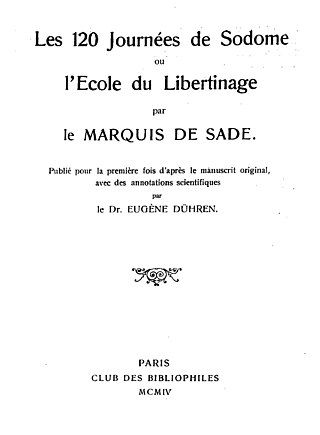
The 120 Days of Sodom, or the School of Libertinage is an unfinished novel by the French writer and nobleman Donatien Alphonse François, Marquis de Sade, written in 1785 and published in 1904 after its manuscript was rediscovered. Described as both pornographic and erotic, its plot revolves around the activities of four wealthy libertine men who spend four months seeking out the ultimate sexual gratification through orgies, sealing themselves away in an inaccessible castle in the heart of the Black Forest in Germany with four madams and a harem of thirty-six victims, mostly male and female teenagers. The madams relate stories of their most memorable clients, whose crimes and tortures inspire the libertines to likewise and increasingly abuse and torture their victims to their eventual deaths.
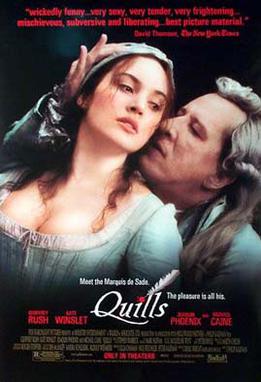
Quills is a 2000 period film directed by Philip Kaufman and adapted from the Obie award-winning 1995 play by Doug Wright, who also wrote the original screenplay. Inspired by the life and work of the Marquis de Sade, Quills re-imagines the last years of the Marquis's incarceration in the insane asylum at Charenton. It stars Geoffrey Rush as de Sade, Kate Winslet as laundress Madeleine "Maddie" LeClerc, Joaquin Phoenix as the Abbé de Coulmier, and Michael Caine as Dr. Royer-Collard.
The role of sadism and masochism in fiction has attracted serious scholarly attention. Anthony Storr has commented that the volume of sadomasochist pornography shows that sadomasochistic interest is widespread in Western society; John Kucich has noted the importance of masochism in late-19th-century British colonial fiction. This article presents appearances of sadomasochism in literature and works of fiction in the various media.

Helen Garner is an Australian novelist, short-story writer, screenwriter and journalist. Garner's first novel, Monkey Grip, published in 1977, immediately established her as an original voice on the Australian literary scene—it is now widely considered a classic. She has a reputation for incorporating and adapting her personal experiences in her fiction, something that has brought her widespread attention, particularly with her novels, Monkey Grip and The Spare Room (2008).

The First Stone: Some questions about sex and power is a controversial non-fiction book by Helen Garner about a 1992 sexual harassment scandal at Ormond College, one of the residential colleges of the University of Melbourne, which the author had attended in the 1960s. It was first published in Australia in 1995 and later published in the United States in 1997.
Transgressive fiction is a genre of literature which focuses on characters who feel confined by the norms and expectations of society and who break free of those confines in unusual or illicit ways.

Justine, or The Misfortunes of Virtue is a 1791 novel by Donatien Alphonse François de Sade, better known as the Marquis de Sade. Justine is set just before the French Revolution in France and tells the story of a young girl who goes under the name of Thérèse. Her story is recounted to Madame de Lorsagne while defending herself for her crimes, en route to punishment and death. She explains the series of misfortunes that led to her present situation.

Kings Cross is an inner-eastern locality of Sydney, New South Wales, Australia. It is located approximately 2 kilometres east of the Sydney central business district, in the local government area of the City of Sydney. It is bounded by the suburbs of Potts Point, Elizabeth Bay, Rushcutters Bay and Darlinghurst.

Australian literature is the written or literary work produced in the area or by the people of the Commonwealth of Australia and its preceding colonies. During its early Western history, Australia was a collection of British colonies; as such, its recognised literary tradition begins with and is linked to the broader tradition of English literature. However, the narrative art of Australian writers has, since 1788, introduced the character of a new continent into literature—exploring such themes as Aboriginality, mateship, egalitarianism, democracy, national identity, migration, Australia's unique location and geography, the complexities of urban living, and "the beauty and the terror" of life in the Australian bush.
Mark Doyle, better known by his stage name Louis Nowra, is an Australian writer, playwright, screenwriter and librettist.
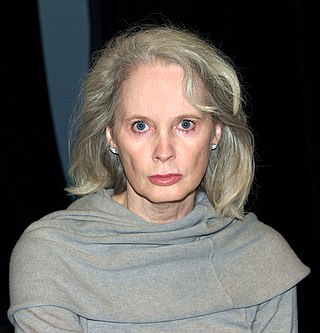
Mary Gaitskill is an American novelist, essayist, and short story writer. Her work has appeared in The New Yorker, Harper's Magazine, Esquire, The Best American Short Stories, and The O. Henry Prize Stories. Her books include the short story collection Bad Behavior (1988) and Veronica (2005), which was nominated for both the National Book Award for Fiction and the National Book Critics Circle Award for Fiction.
Emily Maguire is an Australian novelist and journalist.

There have been many and varied references to the Marquis de Sade in popular culture, including fictional works, biographies and more minor references. The namesake of the psychological and subcultural term sadism, his name is used variously to evoke sexual violence, licentiousness and freedom of speech. In modern culture his works are simultaneously viewed as masterful analyses of how power and economics work, and as erotica. Sade's sexually explicit works were a medium for the articulation of the corrupt and hypocritical values of the elite in his society, which caused him to become imprisoned. He thus became a symbol of the artist's struggle with the censor. Sade's use of pornographic devices to create provocative works that subvert the prevailing moral values of his time inspired many other artists in a variety of media. The cruelties depicted in his works gave rise to the concept of sadism. Sade's works have to this day been kept alive by artists and intellectuals because they espouse a philosophy of extreme individualism that became reality in the economic liberalism of the following centuries.

BDSM is a frequent theme in culture and media, including in books, films, television, music, magazines, public performances and online media.

Donatien Alphonse François, Marquis de Sade, was a French nobleman, revolutionary politician, philosopher and writer famous for his literary depictions of a libertine sexuality as well as numerous accusations of sex crimes. His works include novels, short stories, plays, dialogues, and political tracts. In his lifetime some of these were published under his own name while others, which Sade denied having written, appeared anonymously.

Grunge lit is an Australian literary genre usually applied to fictional or semi-autobiographical writing concerned with dissatisfied and disenfranchised young people living in suburban or inner-city surroundings, or in "in-between" spaces that fall into neither category. It was typically written by "new, young authors" who examined "gritty, dirty, real existences", of lower-income young people, whose egocentric or narcissistic lives revolve around a nihilistic or "slacker" pursuit of casual sex, recreational drug use and alcohol, which are used to escape boredom. The marginalized characters are able to stay in these "in-between" settings and deal with their "abject bodies". Grunge lit has been described as both a sub-set of dirty realism and an offshoot of Generation X literature. The term "grunge" is a reference to the US rock music genre of grunge.
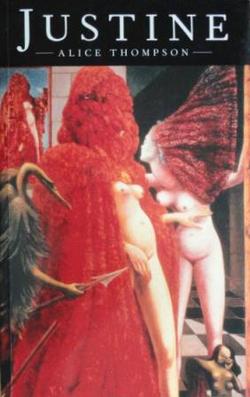
Justine is the debut novel of Scottish author Alice Thompson. Published in 1996 by Canongate Books it was the joint winner of the James Tait Black Memorial Prize that year.
Justine Ettler is an Australian author who is best known for her 1995 novel, The River Ophelia, which was shortlisted for the 1995 Aurealis Awards for Excellence in Australian Speculative Fiction - Horror Division - Best Novel. She is a seminal figure in Australian "grunge fiction" or "dirty realism" literature of the mid-1990s and was labelled 'The Empress of Grunge'. Her second published novel is Marilyn's Almost Terminal New York Adventure (1996) but technically it is her first novel as she wrote Marilyn's Almost Terminal New York Adventure novel before she wrote The River Ophelia. She has also worked as a literary reviewer for newspapers such as The Observer, The Sydney Morning Herald, a teacher, and academic.
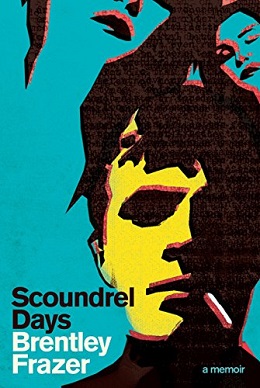
Scoundrel Days is a memoir by Australian contemporary poet Brentley Frazer. Described as "a gritty, Gen X memoir, recounting wild escapades into an under-culture of drugs and violence and sex by ABC Radio National and by the publisher as "Tom Sawyer on acid, a 21st-century On the Road, a Holden Caulfield for punks", literary critic Rohan Wilson compared Frazer's ability to shock, surprise and unsettle with that of Marcel Duchamp, concluding: "Frazer is writing here in the tradition of Helen Garner, Andrew McGahan and Nick Earls.This is dirty realism at its dirtiest ".













